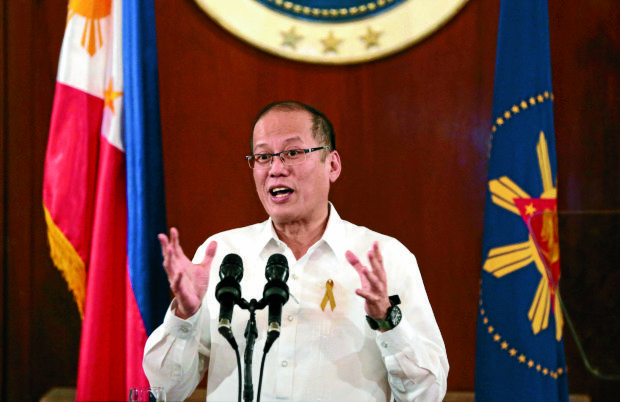
President Benigno Aquino III delivers a message to the nation regarding the Mamasapano incident on Wednesday.
INQUIRER PHOTO / GRIG C. MONTEGRANDE
The insurbordination of the Philippine National Police Special Action Force (SAF) commander led to the clash with Moro rebels that left 44 elite police commandos dead in Mamasapano, Maguindanao province, two years ago, former President Benigno Aquino III said on Thursday.
“If I had a fault as President at the time, it would be this: It never occurred to me that [Director Getulio] Napeñas [the SAF commander] would lie to the President of the Philippines,” Aquino said in a statement in Filipino he issued in response to fresh questions about the botched counterterrorism operation on Jan. 25, 2015, that ended with government security forces sustaining their biggest single-day battlefield loss.
“I trusted a two-star police officer whom I had promoted. I believed that this [Philippine Military Academy] graduate would adhere to the school’s values of ‘Courage, Integrity, Loyalty,’” Aquino said.
Sacked
Napeñas was sacked after the loss of nine officers of the SAF strike force, the 84th Special Action Company (SAC), also known as Seaborne, and 35 officers of the blocking force, the 55th SAC, in “Oplan: Exodus,” the police operation to get Malaysian terrorist Zulkifli bin Hir, alias Marwan, and his Filipino aide, Basit Usman.
Marwan, who had a $5-million price on his head offered by the US government, was killed in the police raid on his hideout in Tukanalipao village, Mamasapano.
Usman got away, but was killed in a subsequent military operation with the cooperation of the Moro Islamic Liberation Front (MILF), the main secessionist rebel group in Mindanao that had signed a peace agreement with the government but whose fighters got involved in the Mamasapano clash despite a ceasefire.
The Ombudsman has brought graft and usurpation charges against Napeñas and former PNP Director General Alan Purisima, who planned the operation and directed its execution, although he was suspended at the time over a graft case.
Aquino offered no explanation for allowing Purisima to direct the police mission, but explained Purisima’s role in his response to charges filed against him over the Mamasapano massacre in the Office of the Ombudsman.
Relatives of the slain commandos, despite receiving assistance from the government, brought the charges, insisting that Aquino was responsible for the deaths of the policemen.
Mamasapano commission
President Rodrigo Duterte on Tuesday announced the formation of a commission to take a fresh look at the massacre, and challenged Aquino to answer lingering questions about the covert police operation that ended in debacle.
Mr. Duterte wanted Aquino to explain why the SAF and not the Army was deployed when the police commandos were trained to combat urban terrorism.
He also wanted to know why Oplan: Exodus was kept a secret and why Aquino concealed the fact that it was a US Central Intelligence Agency operation apparently carried out with the former President’s blessing.
Mr. Duterte also asked who got the $5-million US bounty for Marwan.
In his statement on Thursday, Aquino said the SAF was not only an urban security force but also a rapid deployment force that could operate “anywhere in the country.”
He said he instructed Napeñas to coordinate with the military for armor, artillery, air and troop support in the event the mission was discovered and the Moro rebels responded in force.
But Napeñas, he said, informed the military about the mission only when the commando raid was already under way, instead of “days before” to give the military time to prepare.
Law enforcement
Aquino said the PNP carried out the mission because it had the “actionable intelligence” on the whereabouts of Marwan.
“A reminder: This was a law enforcement operation, and we were acting on the warrant of arrest for Marwan and Usman. We know that the PNP has the police power and has the duty to implement the arrest warrant,” Aquino said.
On the role of the United States in the operation, Aquino said: “I never talked to any American about the mission before and during the operation. As I understand it, the United States helped with the equipment, hardware and intelligence used in the mission.”
Aquino said his adviser on the peace process, Teresita Deles, did not stop him from ordering the military to intervene to save the trapped SAF commandos.
Deles, he said, had no role in the mission, as it was a law enforcement operation.
As for possible repercussions on the peace process, Aquino said it was the MILF that informed the government side about the clash in Mamasapano.
He gave no details, but the joint government-MILF ceasefire group worked to halt the fighting, which lasted nearly the whole day.
Orders to military
Aquino denied that he sent in the commandos to be slaughtered, saying he had witnesses who could testify to his insistence on coordination between the police and the military.
In Zamboanga City, where he received a briefing on the fighting, Aquino said he gave orders for military intervention, expecting the provision of ammunition for the commandos as the least military action.
On who got the bounty for Marwan, Aquino said: “I don’t know, because it was not our reward. Truth be told, we had no involvement in the reward.”
On the question why only two commandos were given the PNP Medal of Valor, Aquino said: “The conferment of the medal goes through a process. This is based on the recommendation of a PNP board.”
But if President Duterte could find a way to award the medal to all of the commandos, he said, “we will agree with that.”